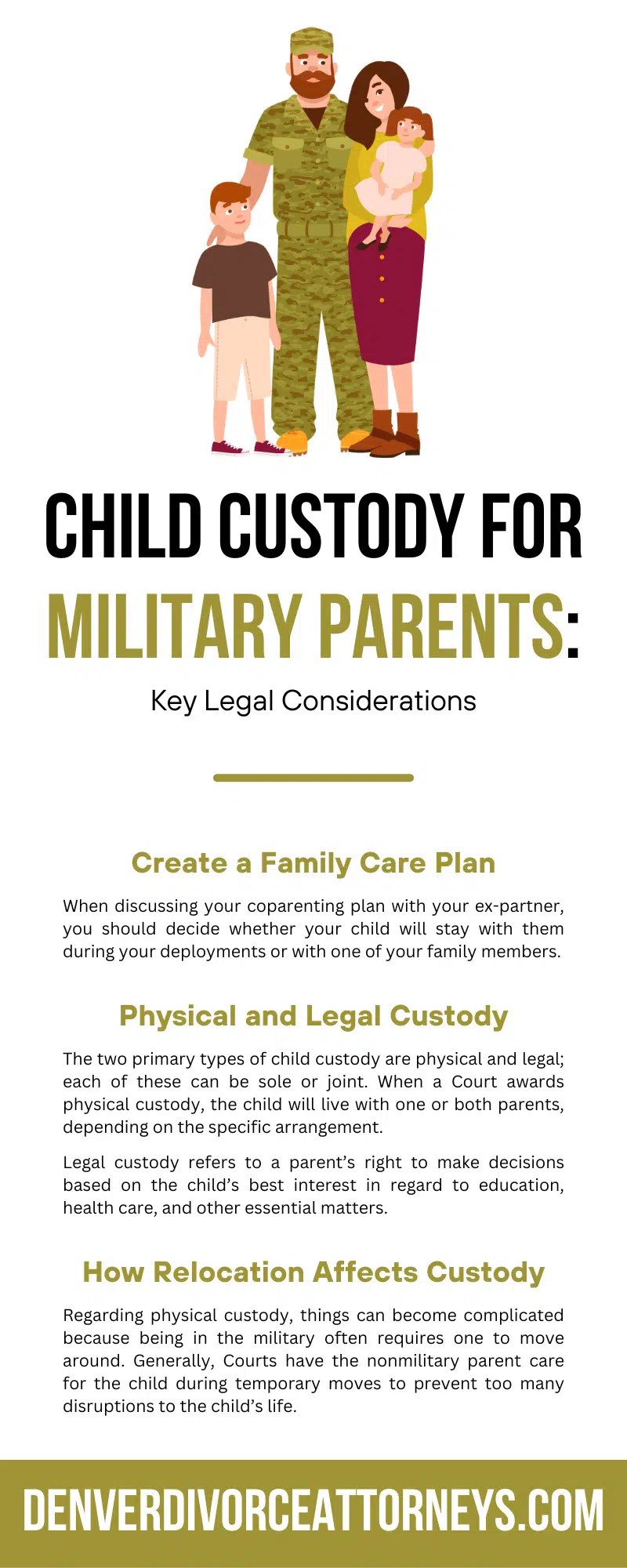The people who choose to serve our country take on an incredible responsibility that can affect all aspects of their lives. Unfortunately, this often includes one’s family life. During a divorce, the military and nonmilitary parents must devise a new parenting plan or have the courts do so for them. To guide you through this process, we’ve outlined some key legal considerations about child custody for military parents.
Create a Family Care Plan
If you or your ex-spouse is an active military member, then you’ll need to create a plan for childcare. Your parenting arrangement for physical and legal custody should take deployments into account.
When discussing your co-parenting plan with your ex-partner, you should decide whether your child will stay with them during your deployments or with one of your family members. For example, a father in the military may request that his child spend his parenting time with the father’s parents. This allows the child to continue bonding with that side of the family.
Physical and Legal Custody
The two primary types of child custody are physical and legal; each of these can be sole or joint. When a Court awards physical custody, the child will live with one or both parents, depending on the specific arrangement. For instance, if a divorcing couple gets joint physical custody, there will be either an agreed-upon or a court-ordered parenting time schedule for which household the child will live in and when.
Legal custody refers to a parent’s right to make decisions based on the child’s best interest in regard to education, health care, and other essential matters. Similar to physical custody, a Court may award parents joint legal custody or give one parent sole legal custody, depending on the circumstances of the case.
Military Parents and Custody
Just like any other parent, a military parent can have joint or sole physical and/or legal custody of their child, depending on their situation. However, most Colorado judges prefer the child to spend time with both parents as long as it’s safe for them to do so.
How Relocation Affects Custody
Regarding physical custody, things can become complicated because being in the military often requires one to move around. Generally, Courts have the nonmilitary parent care for the child during temporary moves to prevent too many disruptions to the child’s life. If you share physical custody of your child and have to make a permanent move across states, you must confer with your co-parent before attending Court to legally change the custody agreement. Never move without informing your ex or the Court, which can lead to legal ramifications. Relocating to another state requires filing a Motion to Relocate along with an Order from a Court granting the parent’s request to relocate the child outside the state of Colorado.
How Active Duty Affects Custody
Military members who get deployed still have a right to bond with their children, and the Uniform Deployed Parents Custody & Visitation Act (UDPCVA) protects this right. Moreover, the Service Member Civil Relief Act (SCRA) also protects parental rights. These acts allow a parent to request a temporary stay in their current location before deployment. While SCRA enables a parent to stay for up to 90 days, UDPCVA offers a maximum stay of 18 months. During your deployment, your child may live with their other parent—if you have joint custody—and you two will need to propose a new parenting plan to the Court. No matter who the child will live with during the deployment, both parents must agree to the terms. If both parties cannot agree to a new plan, judges will intervene to act in the child’s best interest. For this reason, it’s best to begin discussing a temporary change to the agreement as early as possible.
Furthermore, your ex cannot legally alter your permanent parenting agreement during active deployment, as this would violate your parental rights.
Effects on Child Support
Courts also evaluate child support payments during the divorce. Based on income level, one parent may have to provide the other with financial support to meet their child’s needs. A military or nonmilitary parent may have to pay this to the other, depending on the financial situation.
The Child’s Best Interest
Perhaps the most important legal consideration regarding child custody for military parents is their child’s best interest. Serving in the military is one of the greatest things a person can do for our country, and looking out for your child is one of the best things you can do for your family. In any custody case, you should always prioritize your child’s well-being.
There are a lot of major decisions to make, and you and your ex may remain co-parents. When you have joint custody, maintain open communication with your ex and share any news about deployments as early as possible. In the best-case scenario, you two can work with your attorneys to create a parenting plan and present it to a judge with minimal need for time in Court.
Protect Your Rights as a Parent
Colorado Courts firmly believe that every fit parent has a right to spend time with their child. While the Courts do not make parenting decisions based on one’s military status or whether one is the mother or father, having legal representation is essential. If you’re proceeding with a divorce, it’s best to hire an attorney as soon as possible. Family court laws differ from state to state, and an attorney will protect your rights. For instance, a father in the army should contact a father’s rights attorney in Denver to secure the best outcome for his case. This professional can review all legal documents with you, mediate between you and the other party, and look out for your best interest.
As you search for a lawyer, make sure you hire one who practices family law, as they will understand Colorado’s specific rules surrounding divorce and child custody. Most importantly, look for an attorney who puts their clients’ goals first.
Jones Law Firm, PC, Can Help
We have over 30 years of legal experience, and we always take our clients’ cases personally. Whether you’re a mother or father in the military, you can count on our team of attorneys to guide you through this difficult time. Call our law firm today to schedule your free consultation and discuss the details of your case.


